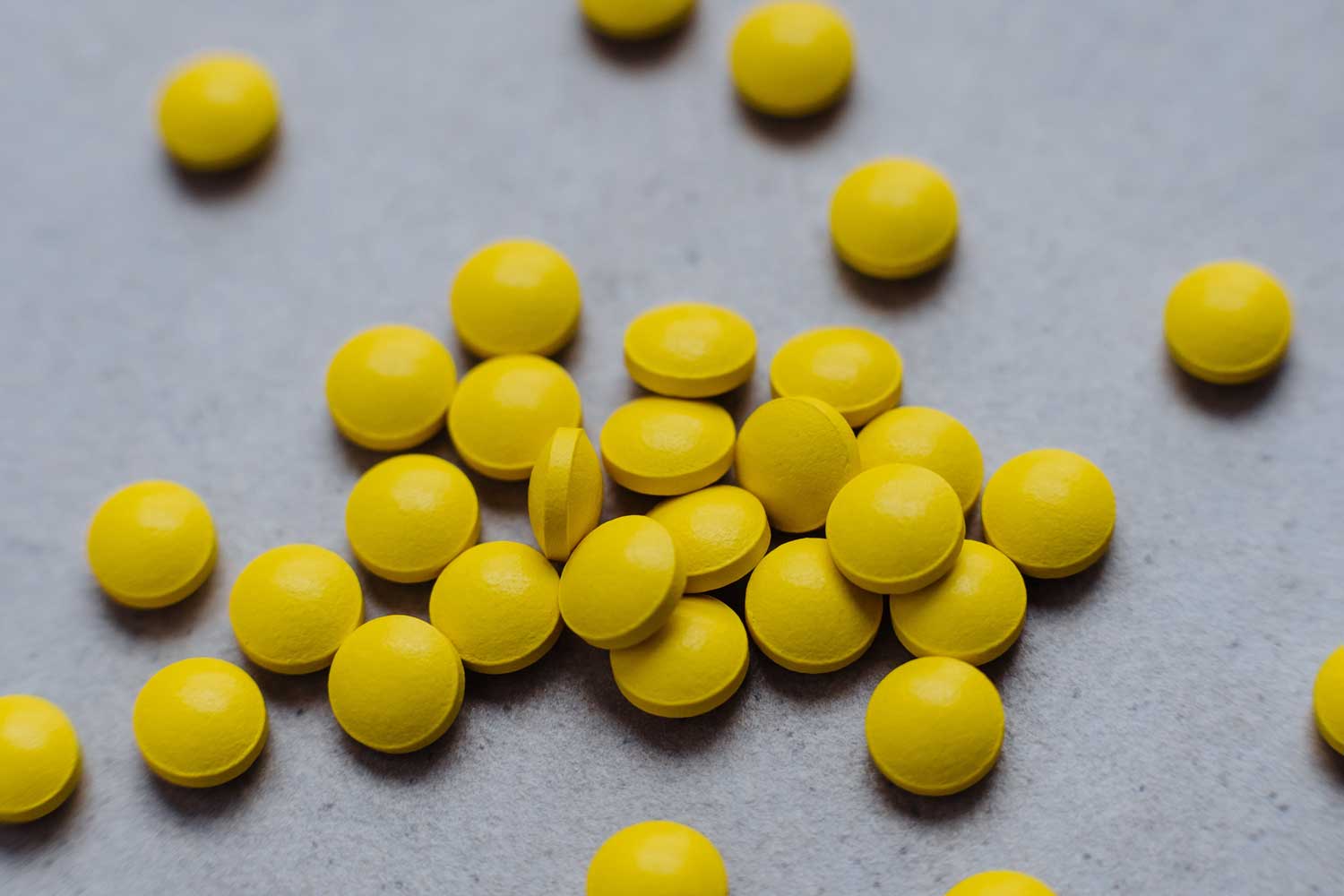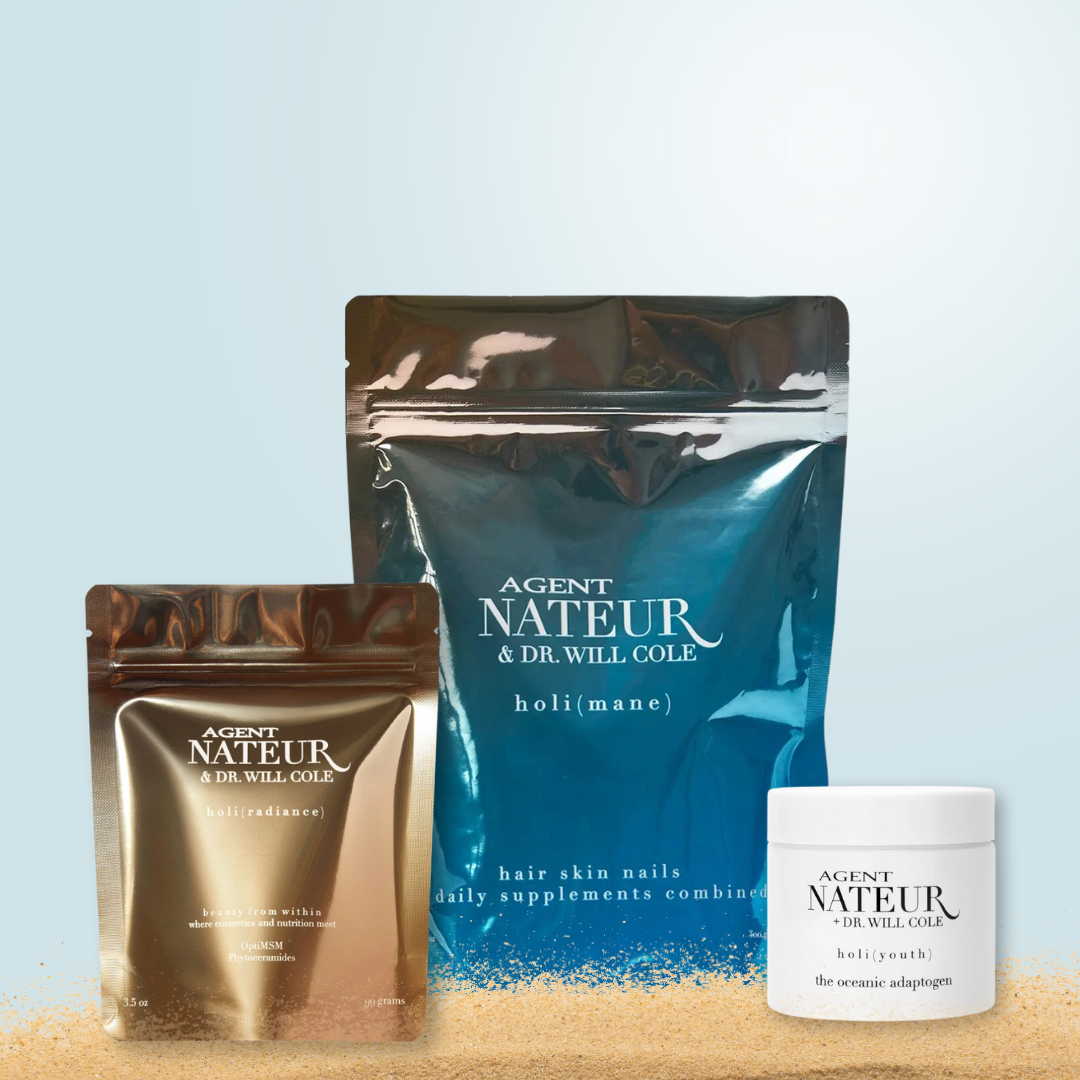What Are Peptides? Everything You Need To Know About Their Beauty + Wellness Benefits

It seems like every day there’s a new supplement that you just have to take. Whether it’s to stay youthful or to strengthen your immune system, it’s difficult to know what’s worth paying attention to and what you should leave sitting on the shelf.
What’s trending currently? Peptides. While these naturally occurring amino acids have always been around, peptides have gained widespread attention for their ability to help with just about everything. Whatever issue you are looking to address, chances are there’s a peptide out there that can help - there are over 7000 different types (1) after all! You may even be surprised at the peptides you are already using without even realizing it.
So if you’re curious whether or not peptides are right for you, read on to learn more about my favorite peptides, their benefits, and how they can help enhance your overall health.
What are peptides?
Peptides are short strings of amino acids between 2 to 50 amino acids long. Although amino acids are considered the building blocks of protein, peptides technically contain fewer amino acids than this macronutrient. Your body naturally produces certain peptides but you can also find them in many different foods, including:
- Meat (beef and poultry)
- Fish
- Dairy
- Legumes
- Hemp and flaxseed
- Oats
- Soy
- Bone broth
Every peptide (all 7000 of them) is classified on several different factors including structure, function, and origin.
Structure
- Oligopeptides: These are short chains of amino acids, typically consisting of 2 to 20 amino acids.
- Polypeptides: Longer chains of amino acids, typically containing 20 to 50 amino acids.
- Proteins: Proteins are larger molecules, usually composed of more than 50 amino acids.
Origin and source
- Endogenous Peptides: These are naturally produced within the body and serve various physiological functions.
- Exogenous Peptides: Derived from external sources, such as food or supplements.
Function
- Anti-inflammatory Peptides: Peptides with anti-inflammatory properties that may be used for conditions like arthritis.
- Antioxidant Peptides: Peptides with antioxidant capabilities that can help protect cells from oxidative damage.
- Anxiolytic Peptides: Peptides with anti-anxiety properties, often used to support mental health.
- Hormones: Peptides that serve as hormones, like oxytocin.
What are the health benefits of peptides?
Every peptide plays a specific role in your body and for your health. While researchers are continuing to learn more about peptides and what they do for us, these are some of their top benefits:
1. Enhanced recovery
Peptides can accelerate your body's natural healing processes including promoting (2) tissue repair and muscle recovery, making them a great tool for athletes and individuals looking to recuperate from injuries or intense physical activity.
2. Improved cognitive function
Certain peptides are known for their cognitive-enhancing properties. They can support memory, focus, mental clarity, and have even been shown (3) to improve pathways involved in the development of dementia-related conditions like Alzheimer’s.
3. Anti-aging
Peptides can stimulate the production of collagen, which is essential for maintaining youthful skin, reducing wrinkles, and improving skin elasticity. Because of their powerful anti-aging abilities, (4) peptides - collagen peptides specifically - have become a popular choice in the cosmetic industry for topical products and beauty supplements. In fact, they are so beneficial for your skin, hair, and nail health that I specifically formulated my co-branded beauty supplements with Agent Nateur, holi ( m a n e ) and holi ( y o u t h ), with marine collagen.
4. Immune system support
Certain antimicrobial peptides and antiviral peptides have immunomodulatory properties, (5) and have even been shown (6) to inhibit virus replication and kill off bacteria like S. aureus, Listeria monocytogenes, and Salmonella.
5. Hormone Regulation
Peptides play a role in hormone regulation, which can be particularly beneficial for individuals with hormonal imbalances with studies looking at their ability to improve low testosterone (7) and other imbalances.
6. Weight Management
If you struggle with metabolic disorders, peptides can be extremely beneficial due to their ability to enhance metabolism, curb cravings, and promote fat burning.
The most popular peptides
With over 7000 different types of peptides, there’s no way that we can cover them all in one article. These are a few of my favorite and well-researched peptides.
1. BPC-157 (Body Protective Compound-157)
BPC-157 is a powerful peptide known for its tissue-healing properties. (8) It can accelerate the healing of muscles, tendons, ligaments, making it a favorite among athletes and those recovering from injuries. Studies also show that it can accelerate (9) wound healing!
2. Collagen
Collagen is the foundation of our body’s structural integrity, making up a significant portion of our skin, bones, tendons, ligaments, and connective tissues, providing strength, flexibility, and stability. As we age, our natural collagen production declines, contributing to the visible signs of aging, joint discomfort, and decreased tissue elasticity. Therefore, collagen is one of the most vital peptides we should be consuming on a regular basis.
3. Spermidine
This peptide is an anti-aging superstar, specifically for its role in promoting autophagy, (10) your body’s cellular self-cleaning process that makes room for healthy new cells.
4. Creatine
As one of the most extensively studied and widely used dietary supplements in the fitness and sports industries, creatine’s primary function is to store and supply energy to cells, especially muscle cells, during activities that require short bursts of energy, like lifting weights, sprinting, and other high-intensity exercises.
5. GHK-Cu (Copper Peptide)
A popular choice for people seeking natural and non-invasive anti-aging tools, GHK-Cu is renowned (11) for its ability to stimulate collagen production, reduce the appearance of fine lines and wrinkles, and enhance skin texture and elasticity.
How to take peptides
There are multiple ways to take peptides depending on the specific peptide and its particular benefit. For example, more common peptides like creatine and collagen can be taken orally in the form of capsules, tinctures, or powders or as an added ingredient to topical creams and lotions. These are readily available and can be found at most health food and vitamin stores. Other ways to get peptides are through subcutaneous injections, nasal sprays, and inhalation but these are less common and typically require more guidance from a doctor familiar with peptide therapy in terms of administration and dosage.
The Takeaway
With so many peptides out there, it can be easy to get overwhelmed. But as with any supplement, don't feel like to you have to jump on the bandwagon just because everyone else is. By listening to your body and carefully considering where you need the most support, peptides can be a great tool to fill the gap in these areas of your health. And to learn more about peptides, listen to my episode of The Art Of Being Well.
As one of the first functional medicine telehealth clinics in the world, we provide webcam health consultations for people around the globe.
View More At Our Store
Purchase personally curated supplements
and Dr. Will Cole’s books!

- Barman, Panchali et al. “Strategic Approaches to Improvise Peptide Drugs as Next Generation Therapeutics.” International journal of peptide research and therapeutics vol. 29,4 (2023): 61. doi:10.1007/s10989-023-10524-3
- Li, Caifeng, and Zongyou Yang. “Evaluation of supplementing active peptide's effect on recovering skeletal muscle micro-injury after track and field exercises.” Pakistan journal of pharmaceutical sciences vol. 30,1 Suppl (2017): 253-256.
- Gupta, Jeetendra Kumar, and Kuldeep Singh. “Pharmacological Potential of Bioactive Peptides for the Treatment of Diseases Associated with Alzheimer's and Brain Disorders.” Current molecular medicine, 10.2174/1566524023666230907115753. 7 Sep. 2023, doi:10.2174/1566524023666230907115753
- Al-Atif, Hend. “Collagen Supplements for Aging and Wrinkles: A Paradigm Shift in the Fields of Dermatology and Cosmetics.” Dermatology practical & conceptual vol. 12,1 e2022018. 1 Jan. 2022, doi:10.5826/dpc.1201a18
- Wiesner, Jochen, and Andreas Vilcinskas. “Antimicrobial peptides: the ancient arm of the human immune system.” Virulence vol. 1,5 (2010): 440-64. doi:10.4161/viru.1.5.12983
- Huan Yuchen, Kong Qing, Mou Haijin, Yi Huaxi "Antimicrobial Peptides: Classification, Design, Application and Research Progress in Multiple Fields" Frontiers in Microbiology Volume 11. 2020. DOI:10.3389/fmicb.2020.582779
- Martinez-Arguelles, Daniel B et al. “Oral administration of VDAC1-derived small molecule peptides increases circulating testosterone levels in male rats.” Frontiers in endocrinology vol. 13 1003017. 4 Jan. 2023, doi:10.3389/fendo.2022.1003017
- Gwyer, Daniel et al. “Gastric pentadecapeptide body protection compound BPC 157 and its role in accelerating musculoskeletal soft tissue healing.” Cell and tissue research vol. 377,2 (2019): 153-159. doi:10.1007/s00441-019-03016-8
- Seiwerth, Sven et al. “Stable Gastric Pentadecapeptide BPC 157 and Wound Healing.” Frontiers in pharmacology vol. 12 627533. 29 Jun. 2021, doi:10.3389/fphar.2021.627533
- Indrani Ghosh, Runali Sankhe, Jayesh Mudgal, Devinder Arora, Madhavan Nampoothiri, Spermidine, an autophagy inducer, as a therapeutic strategy in neurological disorders, Neuropeptides, Volume 83, 2020, 102083, ISSN 0143-4179, https://doi.org/10.1016/j.npep.2020.102083.
- Dou, Yan et al. “The potential of GHK as an anti-aging peptide.” Aging pathobiology and therapeutics vol. 2,1 (2020): 58-61. doi:10.31491/apt.2020.03.014
The information on this website has not been evaluated by the Food & Drug Administration or any other medical body. We do not aim to diagnose, treat, cure or prevent any illness or disease. Information is shared for educational purposes only. You must consult your doctor before acting on any content on this website, especially if you are pregnant, nursing, taking medication, or have a medical condition.
Our content may include products that have been independently chosen and recommended by Dr. Will Cole and our editors. If you purchase something mentioned in this article, we may earn a small commission.

BY DR. WILL COLE
Dr. Will Cole, DNM, IFMCP, DC is a leading functional medicine expert who consults people around the globe, starting one of the first functional medicine telehealth centers in the world. Named one of the top 50 functional and integrative doctors in the nation, Dr. Will Cole provides a functional medicine approach for thyroid issues, autoimmune conditions, hormonal imbalances, digestive disorders, and brain problems. He is also the host of the popular The Art of Being Well podcast and the New York Times bestselling author of Intuitive Fasting, Ketotarian, Gut Feelings, and The Inflammation Spectrum.

Gut Feelings
Healing The Shame-Fueled Relationship
Between What You Eat And How You Feel

